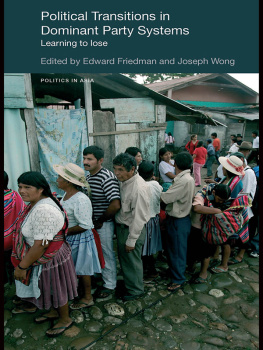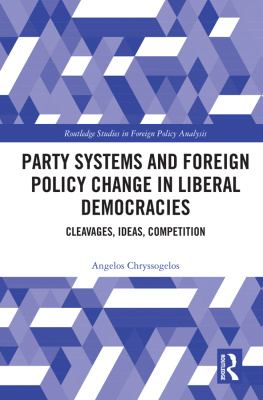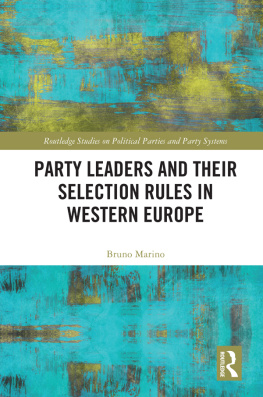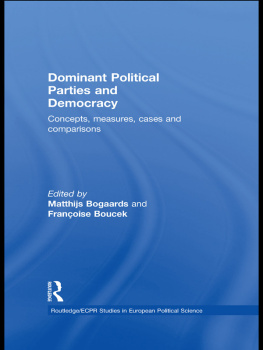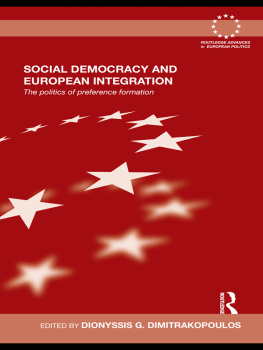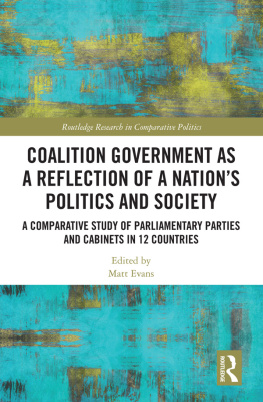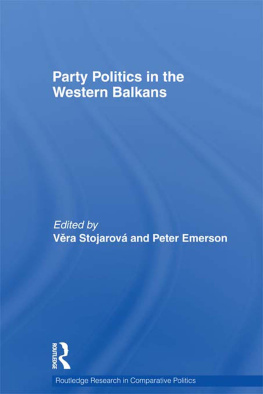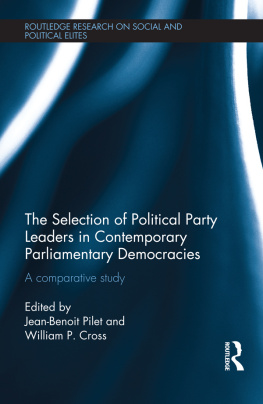Political Transitions in Dominant Party Systems
This outstanding anthology has a clear and innovative vision and combines a series of top quality chapters. I expect that it will become a staple of comparative politics, widely read and cited and assigned in comparative politics core seminars for years to come.
Barrett L. McCormick, Marquette University
This is a path-breaking study by leading scholars of comparative politics examining the internal transformations of dominant parties in both authoritarian and democratic settings. The principle question examined in this book is what happens to dominant political parties when they lose or face the very real prospects of losing? Using country-specific case studies, top-rank analysts in the field focus on the lessons that dominant parties might learn from losing and the adaptations they consequently make in order to survive, to remain competitive or to ultimately re-gain power.
Providing historically based, comparative research on issues of theoretical importance, Political Transitions in Dominant Party Systems will be invaluable reading for students and scholars of comparative politics, international politics and political parties.
Edward Friedman is a Professor in the Department of Political Science at the University of Wisconsin.
Joseph Wong is an Associate Professor of Political Science at the University of Toronto, Canada.
Contributors: Shane J. Barter, Tun-jen Cheng, Alberto Daz-Cayeros, Federico Estvez, Edward Friedman, Anna Grzymala-Busse, Antoinette Handley, John Ishiyama, Cedric Jourde, Byung-Kook Kim, Beatriz Magaloni, Diane K. Mauzy, Christina Murray, T.J. Pempel, Garry Rodan, Susanne Hoeber Rudolph, Lloyd I. Rudolph, Richard Simeon, Laurence Whitehead, Joseph Wong.
Politics in Asia series
Formerly edited by Michael Leifer
London School of Economics
- ASEAN and the Security of South-East Asia
- Michael Leifer
- Chinas Policy towards Territorial Disputes
- The case of the South China Sea Islands
- Chi-kin Lo
- India and Southeast Asia
- Indian perceptions and policies
- Mohammed Ayoob
- Gorbachev and Southeast Asia
- Leszek Buszynski
- Indonesian Politics under Suharto
- Order, development and pressure for change
- Michael R.J. Vatikiotis
- The State and Ethnic Politics in Southeast Asia
- David Brown
- The Politics of Nation Building and Citizenship in Singapore
- Michael Hill and Lian Kwen Fee
- Politics in Indonesia
- Democracy, Islam and the ideology of tolerance
- Douglas E. Ramage
- Communitarian Ideology and Democracy in Singapore
- Beng-Huat Chua
- The Challenge of Democracy in Nepal
- Louise Brown
- Japans Asia Policy
- Wolf Mendl
- The International Politics of the Asia-Pacific, 19451995
- Michael Yahuda
- Political Change in Southeast Asia
- Trimming the banyan tree
- Michael R.J. Vatikiotis
- Hong Kong
- Chinas challenge
- Michael Yahuda
- Korea versus Korea
- A case of contested legitimacy
- B.K. Gills
- Taiwan and Chinese Nationalism
- National identity and status in international society
- Christopher Hughes
- Managing Political Change in Singapore
- The elected presidency
- Kevin Y.L. Tan and Lam Peng Er
- Islam in Malaysian Foreign Policy
- Shanti Nair
- Political Change in Thailand
- Democracy and participation
- Kevin Hewison
- The Politics of NGOs in Southeast Asia
- Participation and protest in the Philippines
- Gerard Clarke
- Malaysian Politics Under Mahathir
- R.S. Milne and Diane K. Mauzy
- Indonesia and China
- The politics of a troubled relationship
- Rizal Sukma
- Arming the Two Koreas
- State, capital and military power
- Taik-young Hamm
- Engaging China
- The management of an emerging power
- Edited by Alastair Iain Johnston and Robert S. Ross
- Singapores Foreign Policy
- Coping with vulnerability
- Michael Leifer
- Philippine Politics and Society in the Twentieth Century
- Colonial legacies, post-colonial trajectories
- Eva-Lotta E. Hedman and John T. Sidel
- Constructing a Security Community in Southeast Asia
- ASEAN and the problem of regional order
- Amitav Acharya
- Monarchy in South East Asia
- The faces of tradition in transition
- Roger Kershaw
- Korea After the Crash
- The politics of economic recovery
- Brian Bridges
- The Future of North Korea
- Edited by Tsuneo Akaha
- The International Relations of Japan and South East Asia
- Forging a new regionalism
- Sueo Sudo
- Power and Change in Central Asia
- Edited by Sally N. Cummings
- The politics of human rights in Southeast Asia
- Philip Eldridge
- Political Business in East Asia
- Edited by Edmund Terence Gomez
- Singapore Politics under the Peoples Action Party
- Diane K. Mauzy and R.S. Milne
- Media and Politics in Pacific Asia
- Duncan McCargo
- Japanese Governance
- Beyond Japan Inc.
- Edited by Jennifer Amyx and Peter Drysdale
- China and the Internet
- Politics of the digital leap forward
- Edited by Christopher R. Hughes and Gudrun Wacker
- Challenging Authoritarianism in Southeast Asia
- Comparing Indonesia and Malaysia
- Edited by Ariel Heryanto and Sumit K. Mandal
- Cooperative Security and the Balance of Power in ASEAN and the ARF
- Ralf Emmers
- Islam in Indonesian Foreign Policy
- Rizal Sukma
- Media, War and Terrorism
- Responses from the Middle East and Asia
- Edited by Peter Van der Veer and Shoma Munshi
- China, Arms Control and Nonproliferation
- Wendy Frieman
- Communitarian Politics in Asia
- Edited by Chua Beng Huat
- East Timor, Australia and Regional Order
- Intervention and its aftermath in Southeast Asia
- James Cotton
- Domestic Politics, International Bargaining and Chinas Territorial Disputes
- Chien-peng Chung
- Democratic Development in East Asia
- Becky Shelley
- International Politics of the Asia-Pacific since 1945
- Michael Yahuda
- Asian States
- Beyond the developmental perspective
- Edited by Richard Boyd and Tak-Wing Ngo
- Civil Life, Globalization, and Political Change in Asia
- Organizing between family and state
- Edited by Robert P. Weller
- Realism and Interdependence in Singapores Foreign Policy
- Narayanan Ganesan
- Party Politics in Taiwan
- Party change and the democratic evolution of Taiwan, 19912004
- Dafydd Fell
- State Terrorism and Political Identity in Indonesia
- Fatally belonging
- Ariel Heryanto
- Chinas Rise, Taiwans Dilemmas and International Peace
- Edited by Edward Friedman
- Japan and China in the World Political Economy
- Edited by Saadia M. Pekkanen and Kellee S. Tsai
- Order and Security in Southeast Asia
- Essays in memory of Michael Leifer

